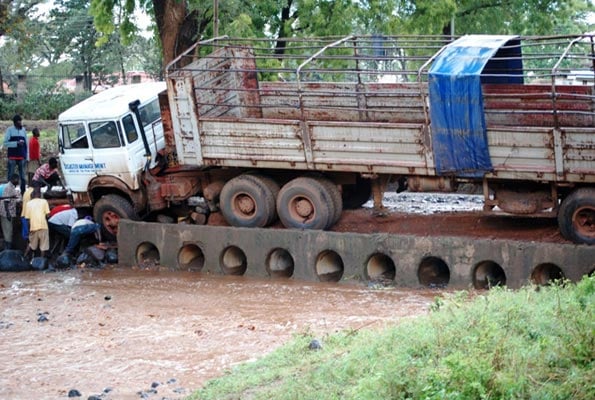Nationwide funding crisis heats up Mbale parliamentary debate

A trailer is stuck after damaging a bridge in Moroto Municipality recently. District representatives decried poor roads. PHOTO BY STEVEN ARIONG
What you need to know:
District representatives highlighted the challenges of local governance, many cutting across the region such as low revenue collections.
MBALE
Lack of drugs in health centres, poorly maintained roads and inadequate funding to districts were some of the issues that dominated debate at the parliamentary outreach in Mbale Town recently.
More than 100 representatives from 25 districts in eastern Uganda participated in the two-day meeting chaired by the Speaker of Parliament, Ms Rebecca Kadaga.
It was also attended by Deputy Speaker Jacob Oulanyah and Leader of Opposition in Parliament Nandala Mafabi, among others.
Representatives from all districts said they suffered from chronic budget shortfalls partly caused by low collections of local revenue following the suspension of graduated tax in 2000. They added that this had made it difficult to provide essential services such as healthcare.
Currently, only about 17 per cent of the national budget is allocated to local government which is insufficient. On average, each district councillor is paid an allowance of Shs15,000 per sitting which is taxed at 30 per cent.
In addition, a big percentage of the development funds transferred to the districts are conditional grants that are tied to specific sectors, leaving little room for districts to allocate money to address local concerns. “We need to have the flexibility to determine how and on what we want to spend the money because we know exactly what our people need on the ground,” Mr Bernard Mujasi, the district chairperson, said.
Ms Grace Watuwa, the Bulambuli District Chief Administrative Officer, said disbursement of funds for Universal Primary Education for term one of the school calendar, which ended two weeks ago, had not been received despite reminders to the Education ministry. “Government needs to help us if they are serious about service delivery,” Ms Watuwa said.
Districts further complained of salaries and allowances paid to local officials, saying they were not equal to the volume of work they do, adding that it was making it difficult to attract and hire highly qualified staff.
A proposal to halt the creation of new districts threw a spanner in the works, sparking a heated debate with some supporting the proposal while others firmly opposed it.
A consensus, however, emerged in end that there was need for government to temporarily stay the process until the current districts are able to support basic activities through tax revenue.
Mr Mafabi called for political tolerance and bi-partisanship on matters of public interest such as the right to assemble for those who wish to engage in civil protest, the fight against corruption as well as fair and equitable distribution of resources in his presentation.
Speaker Kadaga promised to follow up on the recommendations, conduct an orientation programme for the local government on parliamentary procedures and regulation to improve the quality of debate in the district councils.




